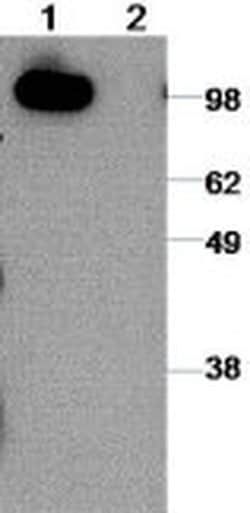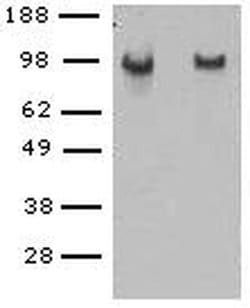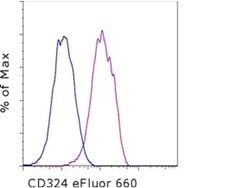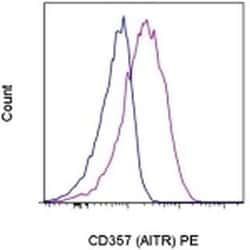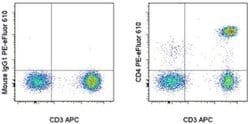CD324 (E-Cadherin) Monoclonal Antibody (DECMA-1), eFluor™ 660, eBioscience™, Invitrogen™
Manufacturer: Fischer Scientific
Select a Size
| Pack Size | SKU | Availability | Price |
|---|---|---|---|
| Each of 1 | 50-112-9366-Each-of-1 | In Stock | ₹ 31,595.00 |
50-112-9366 - Each of 1
In Stock
Quantity
1
Base Price: ₹ 31,595.00
GST (18%): ₹ 5,687.10
Total Price: ₹ 37,282.10
Antigen
CD324 (E-Cadherin)
Classification
Monoclonal
Concentration
0.2 mg/mL
Formulation
PBS with 0.09% sodium azide; pH 7.2
Gene Accession No.
F1PAA9, P09803, P12830
Gene Symbols
CDH1
Purification Method
Affinity chromatography
Regulatory Status
RUO
Gene ID (Entrez)
12550, 442858, 999
Content And Storage
4° C, store in dark, DO NOT FREEZE!
Form
Liquid
Applications
Flow Cytometry, Immunocytochemistry
Clone
DECMA-1
Conjugate
eFluor 660
Gene
CDH1
Gene Alias
AA960649; ARC-1; cadherin 1; cadherin 1, E-cadherin (epithelial); cadherin 1, epithelial; cadherin 1, type 1; cadherin 1, type 1, E-cadherin (epithelial); cadherin e; cadherin-1; cadherin-E; calcium-dependent adhesion protein, epithelial; CAM 120/80; CD324; CDH1; CDHE; cell adhesion molecule; cell-CAM 120/80; ECAD; E-cad; E-Cad/CTF1; E-Cad/CTF2; E-Cad/CTF3; Ecadherin; E-cadherin; E-cadherin 1; E-cadherin precursor; Epithelial cadherin; hab; half baked; LCAM; L-CAM; Um; UVO; Uvomorulin
Host Species
Rat
Quantity
100 μg
Primary or Secondary
Primary
Target Species
Canine, Human, Mouse
Product Type
Antibody
Isotype
IgG1 κ
Related Products
Description
- Description: The monoclonal antibody DECMA-1 recognizes mouse, human and canine CD324 also known as E-cadherin (Epithelial cadherin) or uvomorulin
- Like the other cadherin family members P and N cadherin, E-cadherin is a transmembrane glycoprotein involved in intercellular adhesion
- These proteins share a common basic structure
- The extracellular portions of the proteins are largely composed of repeating domains, each with two consensus Ca2+-binding motifs
- The cytoplasmic domain interacts with a-, b-, and g-catenins and actinins
- These catenins connect E-cadherin with the cytoskeleton
- Expression is found in most epidermal cells including melanocytes and kerotinocytes
- E-cadherin is localized at the intercellular boundaries of epithelial cells in several tissues, and is thought to play a role in maintece of tissue integrity
- Loss of E-cadherin function has been implicated in the progression of a variety of cancers
- E-Cadherin protein is sensitive to trypsin treatment, so exposure to trypsin should be minimized or avoided
- The monoclonal antibody DECMA-1 has been shown to have functional activity by disrupting adhesion in human, mouse and dog cells
- Applications Reported: This DECMA-1 antibody has been reported for use in flow cytometric analysis
- Applications Tested: This DECMA-1 antibody has been tested by flow cytometric analysis of MDCK cell line
- Optimal staining is achieved by intracellular staining as protein turnover can result in variable surface staining
- E-Cadherin (epithelial cadherin) is a classical cadherin from the cadherin (alcium dependent adhesion protein) superfamily
- The encoded protein is a calcium dependent cell-cell adhesion glycoprotein comprised of five extracellular cadherin repeats, a transmembrane region and a highly conserved cytoplasmic tail
- Mutations in this gene are correlated with gastric, breast, colorectal, thyroid and ovarian cancer
- Loss of function is thought to contribute to progression in cancer by increasing proliferation, invasion, and/or metastasis
- The ectodomain of this protein mediates bacterial adhesion to mammalian cells and the cytoplasmic domain is required for internalization
- Identified transcript variants arise from mutation at consensus splice sites
- E-cadherin plays a central role in the growth and development of cells by controlling tissue architecture, and maintenance of tissue integrity
- In humans, E-cadherin is encoded by the CDH1 gene present on chromosome 16
- Studies have demonstrated that reduction and/or loss of E-cadherin expression in carcinomas correlates positively with the potential of these tumors for invasion and metastasis.
